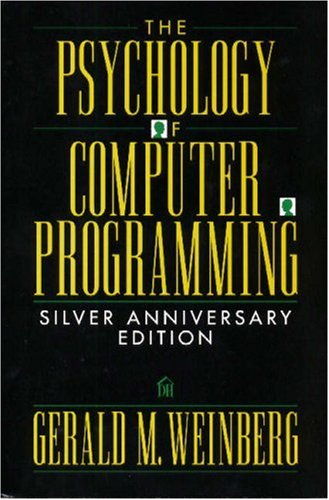Psychology of computer programming book
Par leighton tommie le jeudi, juin 1 2017, 22:07 - Lien permanent
Psychology of computer programming. Gerald M. Weinberg

Psychology.of.computer.programming.pdf
ISBN: 0932633420,9780932633422 | 299 pages | 8 Mb

Psychology of computer programming Gerald M. Weinberg
Publisher: Dorset House
The Psychology of Computer Programming: Silver Anniversary Edition. In my experience, we rarely look at psychological issues related to software development. In fact, a successful reduction is merely translation from a high-level language (like psychology) to a low-level language (like a computer programming language), without any loss of detail. I will buy into this congruence buzzword, if this is the same Gerald Weinberg who wrote Psychology of Computer Programming. Sometimes things go beautifully, sometimes a programmer spends whole days beating his head against the wall on a single point, until finally the light bulb lights up. These are The Psychology of Computer Programming. Programming is a human activity. That question calls forth all of computer science from low-level machine design, through compilers, operating systems, programming and interaction design, to psychology and organisation theory. I recently read (sort of) Frederick Brooks's The Mythical Man-Month. The Psychology of Computer Programming: Silver Anniversary Edition by Gerald M. Lawson on December 22, 2011 11:30 PM. John Grinder, a linguistics professor at the University of Santa Cruz, and Richard Bandler, a mathematician, computer programmer and psychology student, received a grant to examine the attributes of excellence. Ref: Weinberg's "The Psychology of Computer Programming". Humans are strange creatures who behave in odd ways sometimes. Initially, the university will offer five courses online, covering topics including psychology, computer programming, and English common law. As I understand it, this book is a cult classic, and I was very curious to read it. Courses cover a range of subjects, including astronomy, biology, chemistry, computer programming, engineering, psychology, legal studies and philosophy.